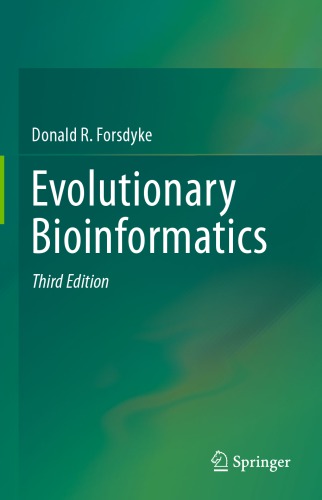Evolutionary Bioinformatics 2016
دانلود کتاب پزشکی بیوانفورماتیک تکاملی
| نویسنده |
Donald R. Forsdyke |
|---|
| تعداد صفحهها |
471 |
|---|---|
| نوع فایل |
|
| حجم |
13 Mb |
| سال انتشار |
2016 |
89,000 تومان
اکنون در ویرایش سوم خود و تکمیل شده با مطالب آنلاین بیشتر، این کتاب قصد دارد بیوانفورماتیک مبتنی بر اطلاعات “جدید” (و نه مبتنی بر ژن) را برای افراد “زیستی” و “اطلاعات” قابل درک کند. کتابهای بیوانفورماتیک به طور سنتی در خدمت پژوهشگران ژن و زیستشناسانی هستند که میخواهند شجرهنامههایی بسازند که نسبهای مرتب شده را نشان دهند. در حالی که به طور گسترده به موضوعات هیجان انگیز کشف ژن و جستجو در پایگاه داده می پردازند، چنین کتاب هایی ژنوم ها را به عنوان کانال های اطلاعاتی که از طریق آن اشکال و سطوح مختلف اطلاعات از طریق نسل ها منتقل می شود، در نظر نمی گیرند. این “بیوانفورماتیک جدید” با بیوانفورماتیک “قدیمی” مبتنی بر ژن که بیشتر متون قبلی را اشغال می کند، در تضاد است. اشکال اطلاعاتی که با آنها آشنا هستیم (ذهنی، متنی) با فرم هایی که کمتر با آنها آشنا هستیم (ژنتیکی) همراه است. این کتاب طیف وسیعی از تفکرات تکاملی را در بر می گیرد که از قرن نوزدهم (داروین، باتلر، رومنس، باتسون)، تا قرن بیستم (گلدشمیت، وایت)، و تا بیست و یکم (آثار پایانی مرحوم استیون جی گولد) آغاز می شود. دیدگاه های متفاوت ممکن است برای مدت طولانی با هم سازگار شوند.
Now in its third edition and supplemented with more online material, this book aims to make the "new" information-based (rather than gene-based) bioinformatics intelligible both to the "bio" people and the "info" people. Books on bioinformatics have traditionally served gene-hunters, and biologists who wish to construct family trees showing tidy lines of descent. While dealing extensively with the exciting topics of gene discovery and database-searching, such books have hardly considered genomes as information channels through which multiple forms and levels of information have passed through the generations. This “new bioinformatics” contrasts with the "old" gene-based bioinformatics that so preoccupies previous texts. Forms of information that we are familiar with (mental, textual) are related to forms with which we are less familiar (hereditary). The book extends a line of evolutionary thought that leads from the nineteenth century (Darwin, Butler, Romanes, Bateson), through the twentieth (Goldschmidt, White), and into the twenty first (the final works of the late Stephen Jay Gould). Long an area of controversy, diverging views may now be reconciled.




